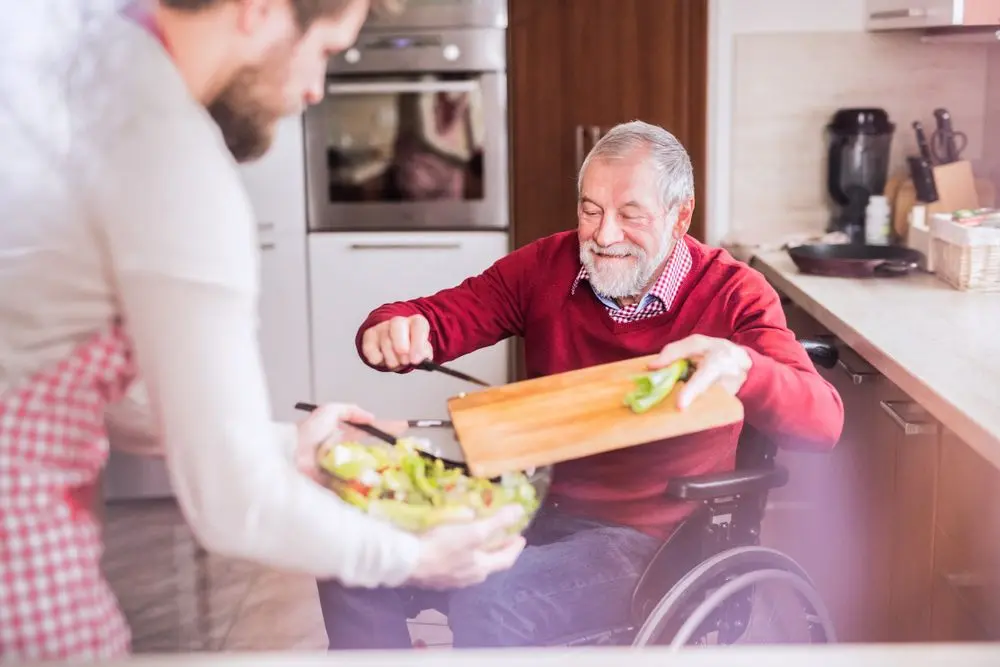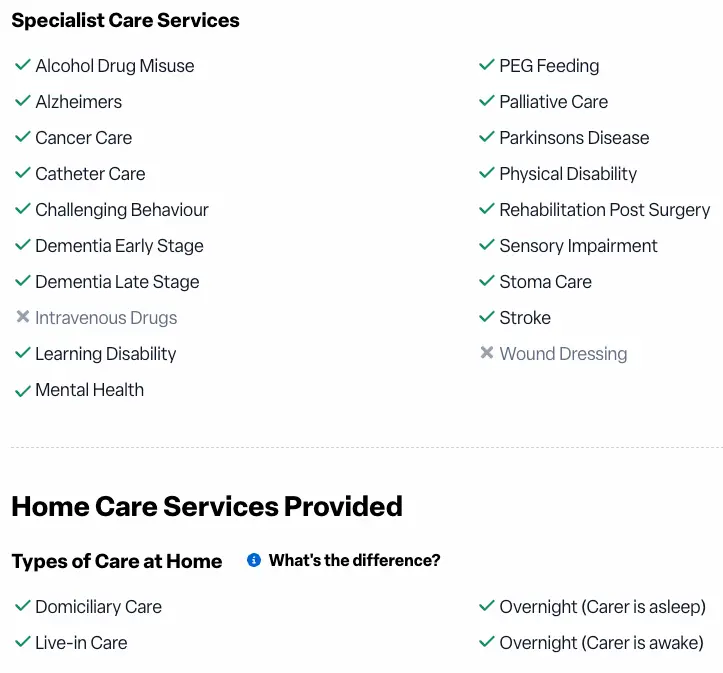Social Services Elderly Care Packages Explained

Estimated Reading Time: 8 minutes
This article was reviewed by Will Donnelly, Co-Founder and CEO at Lottie, on 13th March 2025. Since co-founding Lottie in 2021, Will has helped thousands of care-seekers find their dream care options and was featured in the Forbes 30 Under 30 Europe 2024 for Science and Healthcare. Before Lottie, Will spent 5+ years advising the UK’s foremost care and retirement operators and was also part of the property team that helped lead the NHS during the COVID-19 pandemic. Next review due March 2026.
A social services care package for the elderly lists the care, services (and sometimes equipment) required to meet somebody’s needs. This care package will be created as part of a care plan.
Here, we’ve explained exactly what a social services care package is, who can get a care package, what can be included and who offers care packages in the UK.
Kickstart your care search
Find the best care homes in your area through Lottie.
In this article on care packages for the elderly:
- What is a care package?
- What can be included?
- Who can get a care package?
- Care packages for care at home
- Care packages in the hospital
- Who offers care packages in the UK?
- Appealing or complaining about your care package
What is a Care Package?
A care package is a combination of services put together to meet somebody’s needs after they’ve received a care needs assessment by a social care professional. This will be given as part of a care plan.
A care package for older adults will explain exactly what an individual needs in terms of care, additional services, and any equipment to make their daily life more comfortable and easy to navigate.

What Can Be Included in a Social Care Package
What will be included will depend on the care you need and the setting you receive it in. Some of the services and equipment that are most commonly included in a care package are:
- Household support with tasks such as cleaning, cooking and shopping
- Daily or regular support with personal care (such as support with getting in and out of bed and using the bathroom), often in a residential care home
- Specialist support, including nursing care if your loved one is living with a condition such as Parkinson’s disease or multiple sclerosis, or dementia care if they’re living with a form of dementia such as Alzheimer’s. This could be given in a nursing home, a dementia care home, or another type of care home
- Disability equipment and home adaptations
- Adult day care services to give your loved one different social interactions and experiences while you or another caregiver gets a well-deserved break
- Home care after spending time in the hospital
- A personal assistant to help with much of what’s been mentioned in this list

Who Can Get a Care Package?
A care needs assessment will often be used to determine eligibility for a care package, and to figure out exactly what care and support you or a loved one require. You can ask your local council’s social services department for a care needs assessment. They’ll identify where you might need some extra support and will put together a care plan that’ll include your package of care.
Eligibility will also depend on the company or organisation providing the package. For example, you can ask a GP, social worker or healthcare professional to arrange an initial screening process for NHS continuing healthcare. This will determine whether you or your loved one is eligible for a full assessment. You can also ask for a fast-track assessment if your health or the health of someone you care for is declining.
An organisation called Beacon offer free and independent advice concerning this type of healthcare.
Care Packages For Care At Home
If you or a loved one requires elderly care at home, our website can help you find home care near you.
You can also contact the adult social services department of your local council online or by phone to start this process. Any services offered will be based on an assessment carried out by this department. Ask them for a care needs assessment and provide an overview of any challenges you or your loved one will require support with.
If your loved one has been discharged from the hospital then hospital staff should make sure your loved one can get home, has been given a copy of their care plan/care package and has been provided with any medicine or specialist equipment they may need.
Home care-specific services that may be written into your or your loved one’s personal care plan include:
- Getting in and out of bed in the morning
- Getting dressed and undressed
- Personal hygiene and using the toilet
- Eating and drinking (including meal preparation)
- Nursing care from a registered nurse (and any other health-related tasks as agreed in a care package)
- Specialist dementia support
- Shopping
- Other admin tasks like collecting pensions, managing money and paying bills
- Companionship care and being taken to meet friends
A package of care at home may revolve around temporary care (usually lasting for a maximum of six weeks) or ongoing care (which is expected to last a longer period).
The home care agencies we’re partnered with also offer a range of specialist services for older adults. These include:
- Dementia support (early-stage and late-stage)
- Administering intravenous drugs
- PEG feeding
- Stoma care
- Wound dressing
- Catheter care
- Physical disability support
Each of our home care listings includes which services are and aren't offered, along with the types of home care provided.

Care Packages In the Hospital
If you or a loved one are in the hospital, your healthcare team will automatically consider if an elderly care package is required. They’ll discuss this with you, along with offering any necessary advice.
If you or a loved one may benefit from a social services elderly care package or an NHS care package, this will be arranged before you leave the hospital.
Who Offers Social Care Packages in the UK?
Care packages are offered by different organisations in the UK, including your local authority’s adult social care services department. The NHS also offer care packages for the elderly through NHS continuing healthcare.
For further information and support, Age UK can help with the process of deciding what care you need, whether this be within a care home, 24-hour home care or having adaptations and alterations made to your home.
Social services care package
If your local council decides you’re eligible for any care and support services, they’ll create a care package on your behalf, detailing the care and support you require.
They’ll then give you a personal budget. This is the amount of money your local council is able to pay towards the care and support you need. They’ll either manage this budget for you, or pay the money directly to you or someone else to manage it on your behalf (this is known as a direct payment).
If your local council manages your money, they’ll arrange an agreed upon care package for you (based on what’s in your care plan). If you opt for a direct payment, you’ll arrange this care yourself.
Care package for the elderly through the NHS
NHS continuing healthcare is a care package for the elderly which you may be entitled to if you have a serious disability or illness.
This will cover the full cost of your care and support (within your own home or a care home), including:
- Nursing care
- Any personal care such as help with getting washed or dressed
- Care home fees, along with any accommodation costs
You may qualify for NHS continuing healthcare if you’re classed as having a ‘primary health need’. This means that you require care greater than what your local council can legally provide, so additional care and support is needed. You’ll likely have intense, complex and unpredictable care needs.
This qualification process involves an initial screening. If this goes well, you or your loved one will move on to the next stage - a detailed and full assessment of needs.
Though this assessment process can be complex, you or your loved one will have all health and social care needs funded by the NHS if eligible.
Appealing Or Complaining About Your Care Package
The Care Act of 2014 says that a care package should never be created based on affordability or the constraints of the individual team responsible for a person’s care. Knowing this is especially important when you consider that pressure on social care and social services is currently increasing. Meanwhile, the workforce capable of providing an excellent level of care is shrinking.
Getting a care package right may take several attempts. If it still isn’t working later and you disagree with social services about what you or your loved one need, you can appeal. If you have any serious concerns about a care package for yourself or a loved one, we’d recommend speaking to a solicitor. They may tell you about how the Court of Protection can help.



